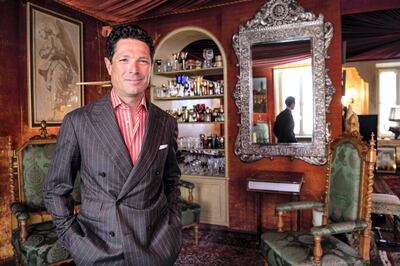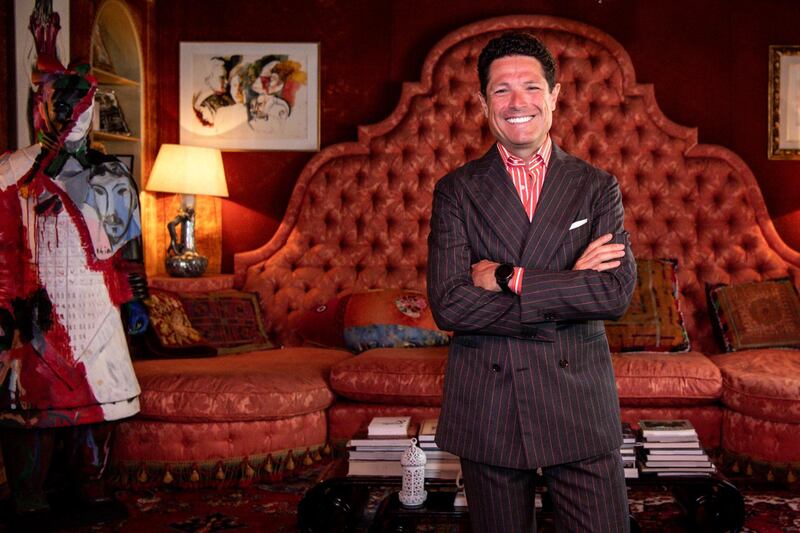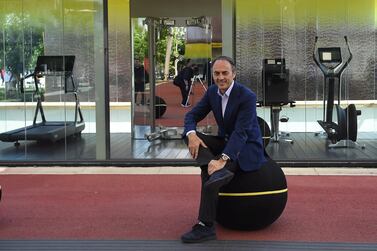It is a pleasant summer evening in Milan. Along the Navigli, the artificial flatboat-canal designed by Leonardo da Vinci during the Renaissance, people are gathered at the small entrance of a grey building.
This is not the glamorous Navigli neighbourhood where locals and visitors flock. This is outskirts of Milan, usually of little interest to tourists and the reason is obvious: the place is dull and unattractive. But gentrification goes on. A once rundown, former wood factory, has been transformed into a casual dining place by the superstar chef Carlo Cracco.
The Segheria, or Saw-Mill, has been chosen by the Dondup fashion brand to host a sophisticated dinner party including a DJ set of 80s music as the Milanese upper class sit outside in a courtyard chatting, attended by a host of waiting staff.
Matteo Marzotto – impeccably dressed in a double-breasted blue suit with an immaculate white shirt and tanned leather loafers – smiles and shakes hands with everyone. Tonight, the scion of one of the prominent families in the fashion industry is celebrating the 20th birthday of Dondup. He has been collaborating with the brand over the past few years. The Marzotto family, which sold the Valentino luxury brand in 2006,
have been in the textile and fashion business since the end of the 19th century, starting out in the Veneto region.
After mouth-watering Piedmont beef tartare canapés and cooked-to-perfection risotto, the party goes on until 1am.
Six months after the party, Mr Marzotto welcomes The National to his very Milanese nest. He is again dressed in a double-breasted suit and has just concluded a deal to invest in an Italian manufacturer of vending machines.
He grabs a glass of water, complaining of a headache and then discusses a more global problem, which he believes Dondup is working to resolve.

"Denim is all about the washing and dyeing process. Italy has a worldwide tradition of colouring denim. In Dondup, we have invented a new system and it is eco-friendly too."
The fashion industry is very much in focus at the moment for its negative impact on the environment. Cotton is a water-intensive crop
, needing 1,000 litres to grow only a kilogram. Dyeing it indigo blue is also thirsty work requiring a single cloth to be dyed multiple times.
Dondup uses lasers instead of the old-fashioned stonewashed system – reducing water consumption by 20 per cent, he says.
“Climate change and global sustainability for the planet: these are the main concerns for human beings which will require all our strong capacity, culture, patience and diplomacy to deal with,” Mr Marzotto says.
The Dondup venture began in the autumn of 2016 for Mr Marzotto – his biggest since the gargantuan Valentino deal with its portfolio spanning luxury brands such as Missoni and Gianfranco Ferre, Hugo Boss and Marlboro Classics.
The Marzotto family bought the haute couture house founded by Valentino Garavani in 2002 for €240 million (Dh967m) and sold it at the peak of the financial bubble, in a deal which valued the company at almost €3 billion, to the global private equity company Permira.
The deal was a monster, the biggest fashion merger and acquisition in the world at the time. The gain was equally epic: almost a 15 times return in four years. The Venetian dynasty split over it, though; part of the family wanted to exit and cash-in, while others opposed.
“I did not want to sell Valentino, if it were up to me, I would have kept the brand,” Mr Marzotto says.
Now Mr Marzotto, who is in his early fifties, has a significant stake in Dondup and is the chairman. The company was born in 1999 in Fossombrone, a small village in the Marche region, whose origins date back to the Roman Empire. It was an outpost along the military road from Rome to Rimini: Mr Marzotto calls it the "Denim Valley". Italian fashion manufacturing follows a long held formula.
Luxury is a global industry, but Italian brands rely on a regional, even provincial, backbone of individuals and local know-how.
Much of the fashionable items sold in big malls are created in some home’s garage in a secluded town in the Italian countryside, far away from the glamour of international cities such as Milan.
"Behind Dondup there is a network of small companies, high-skilled suppliers, craftsmanship, even local traditions," he says.
“I’ve been in this industry for 25 years, my family comes from textile and manufacturing. I personally invested in Dondup: skin in the game, as they say.”
Dondup has now established itself as a luxury jeans brand: with an average price of €250 to €300 a pair in boutiques. The company has about €60m in revenue with an ebitda of 25 per cent.
“So far, we have focused on strengthening our market position in Europe and the US. But I know the UAE very well, from my former businesses, he says.
“We have to expand our presence. I would like to have one or two flagship stores in Dubai, which is a global destination, attracting million of tourists. The malls in the UAE are definitely a goal,” he says.
Mr Marzotto knows Dubai well as he was the chairman of Vicenza Oro, the Italian gold fair, which has been held for 60 years. "We struck the first international joint venture ever with the Dubai World Trade Centre to launch the first B2B jewellery fair [there]," he says.
The present is intriguing but the past is where the Marzotto heritage was born. They are another dynasty – such as the Agnellis – of Italy, even though Matteo is not as famous as the Gianni Agnelli of Fiat. But he has the same global network, as well as some of the glamour of the past Italian business king. It runs in the family: Mr Matteo's great grandfather was the first industrial tycoon in Italy.
Gaetano was already the fourth generation of a textile dynasty, established in 1836. He opened the first hotel chain in Italy, guessing the country had the potential for a modern tourist industry. He also built entire villages with schools and hospitals for his workers and employees, in order to improve the poor living conditions among the urbanised working-class. Until today, the Villaggio Marzotto on the Adriatic coast serves as a resort for people with disabilities.
“My family was the incarnation of the true capitalism’s animal spirits,” Mr Marzotto says. They continue to endorse the social side of the economy. He has a seat on the board of Brunello Cucinelli, the super-upscale cashmere brand, with strong values based on the “fair wages, fair profit” philosophy.
This leads the conversation to arguably the biggest problem facing Italy today; the migrant crisis and the thousands of people still attempting to cross the Mediterranean from North Africa.
“The migrant issue and climate change are linked: wars and famine from droughts force people to move,” Mr Marzotto says.
The European Union “did not listen nor acted, leaving Italy alone to manage a global crisis. I can agree on stereotypes about Italy, but not on important matters: we are not racists nor closed”.
"As a Catholic," he says, he recognises there should be an "area of the world which is inclusive", but this needs to be done "under precise rules".
“A billion people [moving] from the south to north makes no sense whatsoever.” Instead politicians and governments should work to “improve the quality of life and wealth in those countries”.
There are also the long-running economic issues to contend with.
“Italy has been living a crisis for 10 years now, so the word has lost its sense. It’s not an economic crisis, it’s a structural condition. We have an enormous public debt, but creditors are the citizens themselves so this is not an issue.”
Mr Marzotto acknowledged that Italian politics can often seem “abnormal”.
The current coalition government includes members of centre-left and populist parties.
“Politics does not help: we need a government with a long term vision, as the UAE does, not someone looking for the short-term consensus. Still, this country is the second manufacturing economy in the EU; and the biggest luxury manufacturer in the world. The creativity and enthusiasm among the SMEs still make Italy a marvellous country,” says Mr Marzotto.






